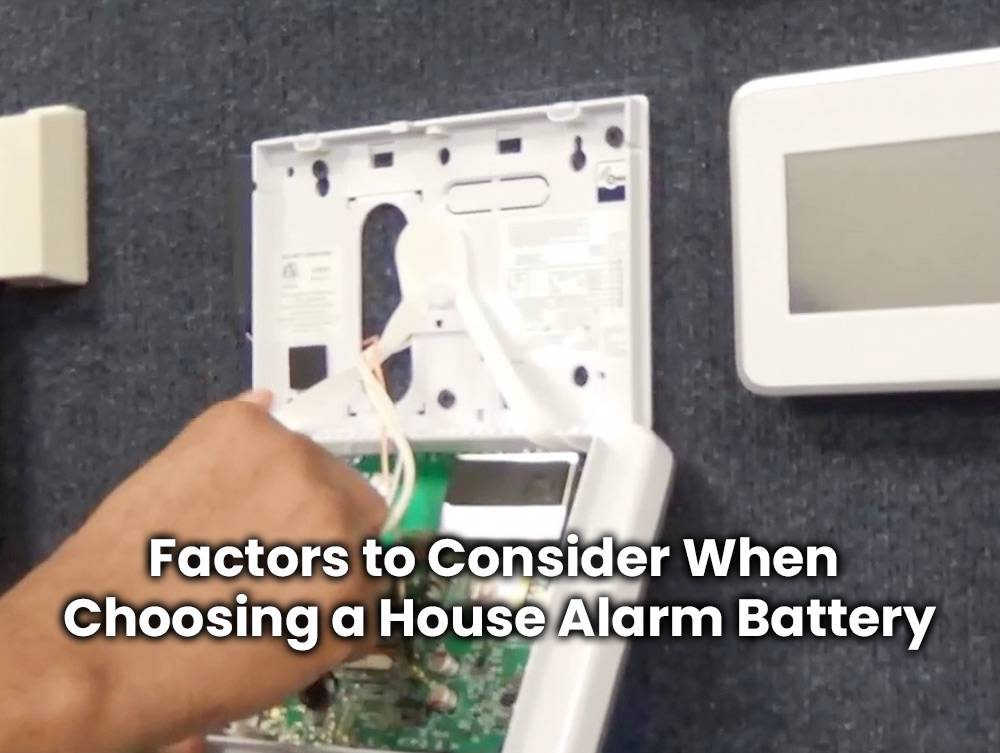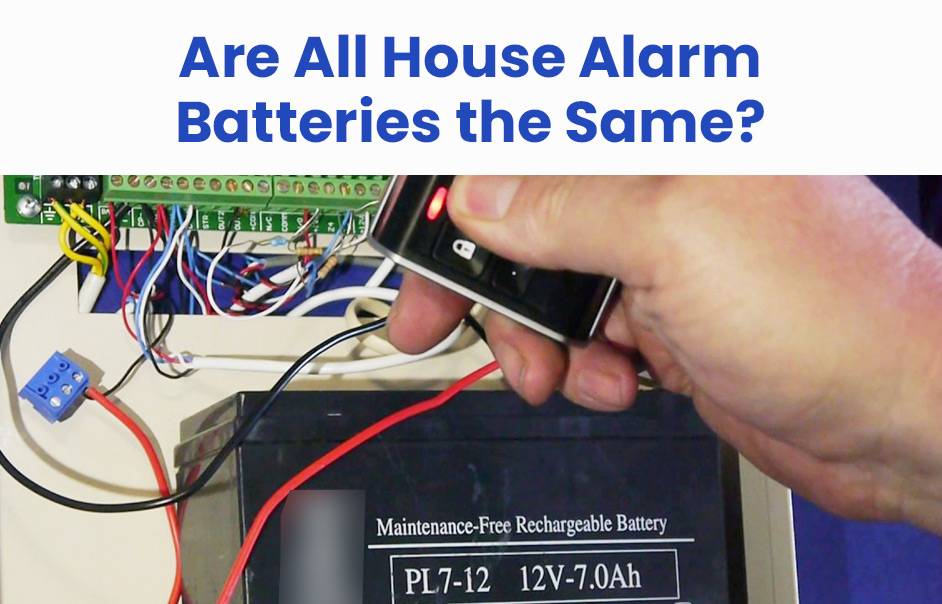Understanding the importance of house alarm batteries
Home security is paramount, and the role of house alarm batteries cannot be overstated. These small powerhouses play a critical role in keeping your alarm system operational and ensuring the safety of your home and loved ones.
Key Points:
- Essential Power Backup:
- Strong Font: House alarm batteries act as the lifeline for your security system, providing crucial backup power during power outages.
- Explanation: Imagine a break-in during a power outage, only to find your alarm system non-functional. House alarm batteries ensure your security remains intact when you need it most.
- Security During Outages:
- Strong Font: Security vulnerability is higher during power outages.
- Explanation: Burglars target homes when alarms might not work. A reliable house alarm battery ensures your security system stays active even when the lights go out.
- Communication with Emergency Services:
- Strong Font: House alarm batteries are vital for prompt emergency response.
- Explanation: They maintain open communication between your security system and monitoring companies, ensuring quick dispatch of help during intrusion or fire incidents.
- Protecting What Matters Most:
- Strong Font: Don’t underestimate the importance of a quality house alarm battery.
- Explanation: Investing in one is essential for peace of mind, knowing you’re prepared for any situation. These small but mighty devices are key to safeguarding your home sweet home.
The different types of house alarm batteries
Choosing the right house alarm battery is crucial for the effectiveness of your security system. Understanding the differences between various types can help you make an informed decision that aligns with your home security needs.
Key Points:
- Lead-Acid Batteries:
- Strong Font: Known for reliability and durability.
- Explanation: Ideal for homeowners due to a long lifespan and ability to withstand extreme temperatures, ensuring continuous power during harsh weather.
- Lithium-Ion Batteries:
- Strong Font: Lightweight and compact, suitable for smaller alarm systems.
- Explanation: Longer lifespan than lead-acid batteries, making them a low-maintenance option with less frequent replacements.
- Nicad Batteries:
- Strong Font: Offer decent performance but require regular maintenance.
- Explanation: Commonly used in house alarms, these batteries ensure reliability but need consistent upkeep for optimal functionality.
- Rechargeable Alkaline Batteries:
- Strong Font: Provide good performance with easy recharging.
- Explanation: Though their lifespan may not match other options, these batteries offer convenience through simple recharging when needed.
- Consideration Factors:
- Strong Font: Size of the system, power requirements, and expected lifespan.
- Explanation: Before deciding, consult professionals or manufacturer recommendations to ensure the chosen battery type aligns with your specific needs.
- Long-Term Benefits:
- Strong Font: Investing in a high-quality house alarm battery is crucial.
- Explanation: Ensures reliable home protection, saving time and money by avoiding frequent replacements or unexpected failures in the long run.
Factors to consider when choosing a house alarm battery
Choosing the right house alarm battery is a critical decision for your home security. Several key factors should be considered to ensure compatibility, reliability, and cost-effectiveness.

Key Points:
- Compatibility:
- Strong Font: Ensure the battery matches your specific alarm system requirements.
- Explanation: Different alarms have varying power needs, emphasizing the need for a battery with the correct voltage.
- Capacity:
- Strong Font: Consider the battery’s capacity for prolonged operation.
- Explanation: A higher capacity ensures your alarm stays operational longer during power outages before needing recharging or replacement.
- Reliability of Brand:
- Strong Font: Opt for reputable brands known for quality and durability.
- Explanation: Choosing a reliable brand provides peace of mind, ensuring the battery won’t fail when you need it most.
- Rechargeable vs. Non-Rechargeable:
- Strong Font: Decide between rechargeable and non-rechargeable options.
- Explanation: Rechargeable batteries may require more maintenance but can be cost-effective by eliminating frequent replacements over time.
- Cost-Effectiveness:
- Strong Font: Balance quality with budget considerations.
- Explanation: Investing in a high-quality house alarm battery is crucial for security, but ensure it aligns with your budget for long-term cost-effectiveness.
- Careful Consideration:
- Strong Font: Thoroughly consider these factors for an ideal choice.
- Explanation: By weighing these aspects carefully, you can select a house alarm battery that meets your needs, ensuring maximum safety and protection for your home.
Common misconceptions about house alarm batteries
Understanding the truth about house alarm batteries is crucial for effective home security. Several common misconceptions often misguide homeowners, potentially leaving their homes vulnerable to security threats.
Key Points:
- Not All Batteries are Equal:
- Strong Font: A prevalent misconception is that all house alarm batteries are the same.
- Explanation: Different alarm systems require specific battery types for efficient and effective operation, challenging the idea that any battery will suffice.
- Lifespan Variability:
- Strong Font: Another misconception is assuming all batteries have a similar lifespan.
- Explanation: While most house alarm batteries last three to five years, factors like usage patterns and environmental conditions can cause significant variations.
- Proactive Maintenance is Crucial:
- Strong Font: Some believe they only need to replace their alarm battery when it completely dies.
- Explanation: Waiting until a battery fails poses risks, leaving your home susceptible to intruders. Proactive maintenance and timely replacements are essential for reliable security.
- Quality Matters Over Price:
- Strong Font: Purchasing a cheaper generic battery is thought to offer similar performance.
- Explanation: In reality, investing in a high-quality house alarm battery ensures better reliability and longer-lasting power supply during emergencies, outweighing the allure of cheaper alternatives.
- Backup Battery Necessity:
- Strong Font: Some homeowners believe constant electrical outlet connection eliminates the need for a backup battery.
- Explanation: While connected outlets provide normal power, having a backup battery becomes crucial during outages or intentional electricity cuts by burglars.
- Informed Decision-Making:
- Strong Font: Understanding these misconceptions is vital for informed decisions.
- Explanation: Don’t fall victim to false assumptions; choose the right battery type and invest in quality products for consistent, reliable home security.
Tips for maintaining and replacing your house alarm battery
The benefits of investing in a high-quality house alarm battery
Investing in a top-notch house alarm battery brings significant benefits to homeowners, ensuring a reliable and effective security system. The advantages extend from enhanced performance to cost-effectiveness and peace of mind.
Key Points:
- Reliability and Effectiveness:
- Strong Font: A high-quality house alarm battery guarantees the reliability of your security system.
- Explanation: Reputable brands with advanced technology offer superior performance and extended power, assuring your home is consistently protected.
- Durability and Longevity:
- Strong Font: Quality batteries withstand harsh conditions, preventing frequent replacements or unexpected failures.
- Explanation: Designed for extreme temperatures and power surges, these batteries ensure uninterrupted operation, providing long-lasting security.
- Cost-Effectiveness:
- Strong Font: Initial higher costs are outweighed by superior performance and extended lifespan.
- Explanation: High-quality batteries prove cost-effective over time, often accompanied by extended warranties for added value and protection.
- Ease of Maintenance:
- Strong Font: Superior technology requires less frequent monitoring and replacement.
- Explanation: Advanced features enable efficient energy usage and optimized power management, resulting in longer intervals between maintenance tasks.
- Contributing to Peace of Mind:
- Strong Font: Enhancing overall peace of mind by prioritizing home security.
- Explanation: Choosing an exceptional battery demonstrates proactive measures for the safety of your loved ones and belongings.
- Conclusion without Saying “In Conclusion”:
- Strong Font: Selecting the right house alarm battery is crucial for optimal security system performance.
- Explanation: Understand the available types, consider essential factors, dispel misconceptions, and implement proper maintenance for efficient and long-lasting home security.

